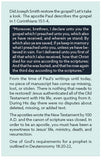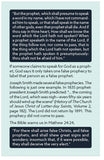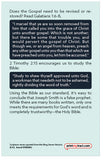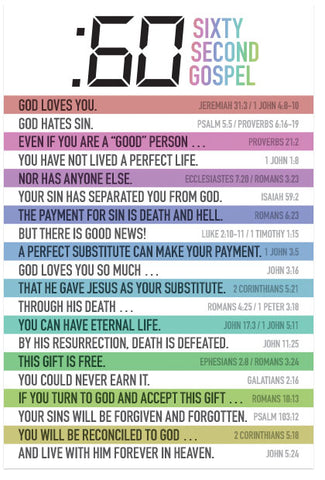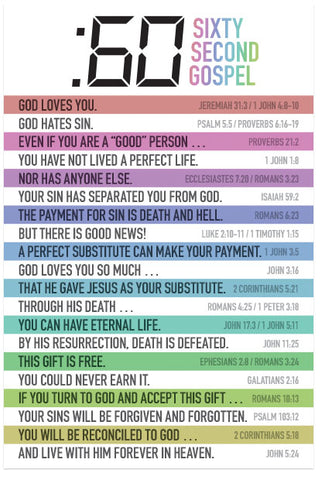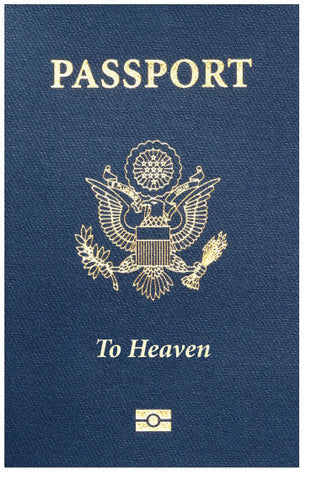Did Joseph Smith Restore the Gospel? (KJV)
Special-Order Folded Tract
 NOTE: This item is custom-printed to order (click for more details).
NOTE: This item is custom-printed to order (click for more details).
This tract is from our print-on-demand library, and is not kept in stock. Select the options below, and we will custom-print a batch just for you. Because this item is custom-printed, you can add your custom imprint to the back page at no extra cost.
- Estimated shipping date: Thursday, December 4 (Click for more details)
- SKU:
- Discounts: Discount coupons do not apply to this item
- Format: Folded Tract
- Size: 3.5 inches x 5.5 inches
- Pages: 4
- Imprinting: Available with 5 lines of custom text
- Version: KJV
- Returns: Because this item is custom-printed to order, it cannot be returned.
Show all item details
The full text of this tract is shown below in the KJV version. (Do you want to print this tract in a different version than the one listed? Contact us and let us know what you're looking for—we may be able to create the alternate version for you at no charge.)
Did Joseph Smith restore the gospel? Let’s take a look. The apostle Paul describes the gospel in 1 Corinthians 15:1-4,
“Moreover, brethren, I declare unto you the gospel which I preached unto you, which also ye have received, and wherein ye stand; By which also ye are saved, if ye keep in memory what I preached unto you, unless ye have believed in vain. For I delivered unto you first of all that which I also received, how that Christ died for our sins according to the scriptures; And that he was buried, and that he rose again the third day according to the scriptures.”
From the time of Paul’s writings until today, no piece of manuscript has come up missing, lost, or stolen. There is nothing that needs to be restored! Jesus authenticated all of the Old Testament with His life, even quoting from it. During His day there were no disputes about deleted, missing, or added text.
The apostles wrote the New Testament by 100 A.D. and the canon of scripture was closed. In order to be an apostle, you must have been a eyewitness to Jesus’ life, ministry, death, and resurrection.
One of God’s requirements for a prophet is outlined in Deuteronomy 18:20-22,
“But the prophet, which shall presume to speak a word in my name, which I have not commanded him to speak, or that shall speak in the name of other gods, even that prophet shall die. And if thou say in thine heart, How shall we know the word which the Lord hath not spoken? When a prophet speaketh in the name of the Lord, if the thing follow not, nor come to pass, that is the thing which the Lord hath not spoken, but the prophet hath spoken it presumptuously: thou shalt not be afraid of him.”
If someone claims to speak for God as a prophet, God says it only takes one false prophecy to label that person as a false prophet.
Joseph Smith made several false prophecies. The following is just one example. In 1835 prophet-president Joseph Smith predicted: “… the coming of the Lord, which was nigh—even fifty-six years should wind up the scene” (History of The Church of Jesus Christ of Latter-day Saints, Volume 2, page 182). The Lord did not return by 1891. This prophecy did not come to pass.
The Bible warns us in Mathew 24:24,
“For there shall arise false Christs, and false prophets, and shall shew great signs and wonders; insomuch that, if it were possible, they shall deceive the very elect.”
Does the Gospel need to be revised or restored? Read Galatians 1:6-8,
“I marvel that ye are so soon removed from him that called you into the grace of Christ unto another gospel: Which is not another; but there be some that trouble you, and would pervert the gospel of Christ. But though we, or an angel from heaven, preach any other gospel unto you than that which we have preached unto you, let him be accursed.”
2 Timothy 2:15 encourages us to study the Bible:
“Study to shew thyself approved unto God, a workman that needeth not to be ashamed, rightly dividing the word of truth.”
Using the Bible as our standard, it’s easy to conclude that Joseph Smith is a false prophet. While there are many books written, only one meets the requirements for God’s word and is completely trustworthy—the Holy Bible.



